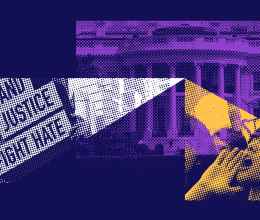
The League of Municipalities panel, “ACLU-NJ at The League: Leaders of New Jersey’s Legislative Caucuses of Color,” brought together the Legislative Black Caucus, the Legislative Latino Caucus, and the Asian American Pacific Islander Legislative Caucus for a historic conversation about developing a shared legislative agenda for racial justice.
NEWARK – The ACLU of New Jersey, with support from Stono Public Affairs, hosted a breakfast and panel discussion at the League of Municipalities with representatives from the New Jersey State Legislature Caucuses of Color: the Legislative Black Caucus, the Legislative Latino Caucus, and the Asian American Pacific Islander Legislative Caucus. This first-of-its-kind conversation reflected on past and current collaborations across the groups, and how they can continue to leverage their collective power to develop a shared agenda that reflects New Jersey’s diverse population.
The panel featured State Senator Nellie Pou, Chair of the Legislative Latino Caucus, Assemblywoman Shavonda Sumter, Chair of the Legislative Black Caucus, and two members of the Asian American Pacific Islander Legislative Caucus, Assemblywoman Sadaf Jaffer and Assemblyman Sterley Stanley. The conversation was moderated by ACLU-NJ Executive Director Amol Sinha.
Sinha kicked off the panel with remarks on the important role these caucuses play in the work toward racial justice in New Jersey.
“Representation matters. By some measures, New Jersey is one of the most diverse states in the country and it’s poised to be a majority person-of-color state before the end of the decade,” said Amol Sinha, Executive Director of the ACLU of New Jersey. “Our communities are more visible than ever, and with visibility comes political power, and with political power comes opportunity for revolutionary policy change. We need a collective agenda designed to build power and lift us all up, because if one community is oppressed, we’re all at risk.”
The legislators each talked about their current caucus priorities, the successes they’ve seen through collaboration, the common threads between their work, and thoughts on the evolution of the caucuses.
“This is a historic moment for all of us,” said Senator Nellie Pou, Chair of the Legislative Latino Caucus. “I will tell you I do not ever recall having this opportunity to speak with our different members of the caucuses of color that we work with. A lot of significant reforms have been initiated by our individual caucuses. When we take a united stance, we can make bold changes.”
Among the collaborative legislative wins referenced were decriminalizing marijuana, restoring voting rights for those on parole or probation, codifying the right to abortion, and the Public Health Emergency Credit law, which granted early release from prison for thousands of New Jerseyans during the COVID-19 pandemic.
“We have a robust agenda of over 300 social justice restoration bills we’re considering right now,” said Assemblywoman Shavonda Sumter, Chair of the Legislative Black Caucus. “It’s work that we continue to build upon. It’s not that we will get it done in that one session, but we keep chipping away at the systemic barriers that impact our communities adversely. As the oldest caucus, we support the other caucuses to see where we can provide guidance. We stand on principle. We stand on structural changes through policy. And we continue to find issues where we can unite together.”
“The opportunity to have this conversation is overdue, and I’m eager to help us focus and set a racial justice agenda,” said Assemblyman Sterley Stanley, member of the Asian American Pacific Islander Legislative Caucus. “The undercurrent of racism is a continued threat that is coming to the forefront. This is a time for us to all get together and get things done.”
“There are assumptions on what the majority of voters want that aren’t really based on the truth,” said Assemblywoman Sadaf Jaffer, member of the Asian American Pacific Islander Legislative Caucus. “That’s why we need diverse leaders in elected office so they can correct those assumptions and bring the real issues to the attention of legislatures. We have a lot of representation of minorities in the legislature, but we’re not in leadership, in either House, or the Governor’s mansion. We can unite the caucuses to set agendas and establish priorities.”




